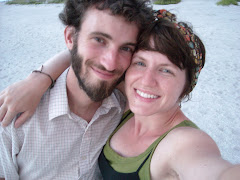We had heard that the island of Lagonav was a difficult place to visit, so we weren't that excited when we heard that we would be spending a long weekend there to visit a partner, Lekol Komunite Matenwa Pou Devlopman (LKMPD), or the Matenwa Community School. We've also heard that Lagonav residents are among the poorest in Haiti, that communities are regularly wiped out by flooding, deforestation was almost total, and that traversing the island is so difficult that no accurate map of the interior actually exists.
Despite what we'd heard (and finding out last-minute that we'd be staying not at the school but with a family, which can be quite hit-or-miss), we found at least one corner of the island to be a charmed place. In Matenwa, there's an active reforestation program (Step 1: convince the community), people there seem to be habituated to blans (they made jokes! they didn't ask for money!), and being in the mountains was a cool and refreshing change (long sleeves! easy sleeping!).
Our coworkers wanted to take a fly-boat, so we soared across the 20 miles between the Haitian mainland and Lagonav (despite the one return to the dock because the boat was overloaded by a few people). We also wondered about the setup on the next boat over, a sailboat with a Toyota at the prow, and an engine to assist:



We also got to visit an artisanal collective, where we watched a woman working on a silk painting that will be sold in Boston. There we spied the following note from one demanding Deirdre, who wants details:

And sunsets! Usually the sun sinks quietly behind a mountain in Dezam, a fact we didn't realize until we saw the likes of this:

However, we started to realize that we have only scratched the surface of Creole in the following exchanges:
Me: How many children does your mother have?
Our host: My mother has 8 children. I have 6 sisters.
Me: So you have 1 brother.
Host: No, I have 3 brothers.
Me, adding frantically in my head: ??
Host (to her youngest sister, who looks significantly younger than our host): Go get the the picture of all of us.
The pi ti fi, returning: Here you go.
The photo, taken at a wedding, is of newlyweds, another woman, and three young girls standing in front of the adults.
A pause.
Host: Oh, these kids are actually nieces.
Later:
Host's husband: How long have you been married?
Bryan: About 4 years.
Me: How about you?
Host's husband: I'm 29 years old.
Since you're only getting my translation, which reflects my confusion, you can be sure a major cause of us misunderstanding was our insufficient Creole! However, we also had several awkward moments like these:
Saturday morning, 7:15 a.m.:
Sister of 6-to-9 Siblings: Oh, did you want breakfast before your meeting? Are you leaving now?
Bryan & me, not sure if that's what we should request, but also not knowing where else to buy food: Um... in a little while...
Twenty-Nine: Oh, you're leaving after you eat, right?
Sister of 6-to-9: Okay.
She disappears for about 45 minutes, while we stand around furiously whispering about whether we should wait for food and show up late to our scheduled 8:00 a.m. meeting (and, of course, we had no cell reception on the mountain) or whether we should assume she's not making food for us and we should try to find food somewhere along the way. Around 8:15, though, breakfast was on the table and we were on our way shortly thereafter. (And the people we were meeting were even later than that, so no harm done.)
In reflecting on the weekend, we realized:
1. When we stay in the homes of other Americans, there is a lot of attention to arranging details. "What time will you wake up?" "Will you be eating breakfast here?" When I ask, "Do you have toilet paper?" the American answer isn't usually, "Oh, do you need that? I didn't have time to buy any."
2. In the U.S., a boat driver who felt that the boat was overloaded by 3 people wouldn't let 4 new people board, then return to the dock and make several other people get off.
3. There are probably good and logical reasons for the above.
We realized that we've been taking our own culture for granted: even after being here for over 3 months, we still assume that being American is being part of a neutral culture, that being American is the norm. Seeing ourselves through others' eyes ("Why don't they understand family structures? Why are they so obtuse about mealtimes?") reminds me that American culture, however globalized, is still totally foreign in many parts of the world. Fortunately.
And LKMPD? It actually turned out to be a wonderful school with progressive programming for each grade. We briefly visited classrooms, observed a hands-on lesson about seed germination, and checked out the school's garden. Spending 8 minutes on the following is well worth your time:


1 comment:
I'm reading the book, Cross Cultural Connections by Duane Elmer, and it's proving to be a good read. Talks exactly about culture and communication. Sigh, it's a hard go, but keep listening and watching, and someone sometime said it does get easier.
Post a Comment